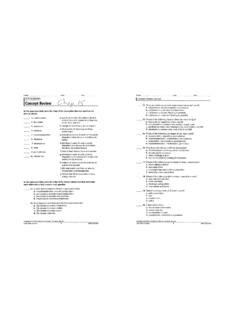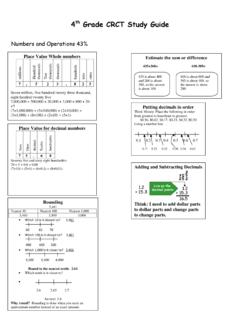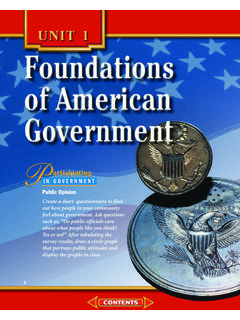Transcription of Chapter 3: The Constitution
1 Protecting Your Rights How well do you know your rights? What constitutional protections do you enjoy as a United States citizen? Few people know the Constitution very well, yet we all rely on its provisions to ensure a stable government that works within defined limits. To learn more about how the Constitution is a relevant document that protects your rights today, view the Democracy in Action Chapter 3 video lesson: The Constitution A Living Document . GOVERNMENT. Chapter Overview Visit the United States Government: Democracy in Action Web site at and click on Chapter 3 Overview to preview Chapter information. 62. Section 1. Structure and Principles T. he Founders created the Constitution Reader's Guide more than 200 years ago. Like Mon- Key Terms tesquieu, they believed in a separation of powers. They divided the federal govern- article , jurisdiction, supremacy clause, amendment, popular sovereignty, federalism, separation of ment into legislative, executive, and judicial powers, checks and balances, veto, judicial review branches.
2 The Constitution established a republic, in which power is held by voting citizens through Find Out their elected representatives. It provides citizens What is the basic structure of the Constitution ? with information about their rights and about How did the Founders hope to prevent any one what they may reasonably expect of their govern- branch of government from gaining too much ment. The success of this system of government power? depends on an informed, participating citizenry. An understanding of the Constitution is key to un- Understanding Concepts derstanding the structure and daily function of Constitutional Interpretations What beliefs and American government. principles in the Constitution help to build a na- tional identity for the United States? Structure Compared with the constitutions of other countries, the United States Constitution is simple and brief.
3 It establishes the structure and Book Banned powers of government but does not spell out every aspect of how government will function. The PARIS, FRANCE, 1751 Founders wisely left it to future generations to work out such details as the need arose. The Con- book by a French noble stitution contains about 7,000 words and is divid- A is attracting attention and controversy. In The Spir- ed into three parts the Preamble, the articles, and the amendments (for the entire text, see the ree it of Laws, published th Reference Handbook, pages 774 799). de years ago, Charles-Louis - on Secondat, the baron de M The Preamble The Preamble, or introduc- ng tesquieu, proposed dividi tion, states why the Constitution was written. In exec- political authority into the Preamble, the Founders indicated that they icial utive, legislative, and jud wanted a government that would provide stabil- ued powers.
4 Montesquieu arg ity and order, protect citizens' liberties, and serve of that assigning each set the people: an ch powers to a separate br pro- of government would mote liberty. Although book has supporters in his The Spirit of Laws Eng- be en book To form a more perfect Union, establish Justice, insure domestic Tranquility, pro- vide for the common defence, promote the land and America, it has out Europe. general Welfare, and secure the Blessings harshly attacked through . of Liberty. The Preamble . The Constitution on display at the National Archives Chapter 3: THE Constitution 63. Seven Articles The Constitution contains seven article III, Section 1, establishes a Supreme divisions called articles. Each article covers a general Court to head the judicial branch. The section also topic. For example, Articles I, II, and III create gives the national government the power to create the three branches of the national government the lower federal courts.
5 Section 2 outlines the juris- legislative, executive, and judicial branches. Most of diction, or the authority, of the Supreme Court the articles are divided into sections. and other federal courts to rule on cases. Section 3. article I establishes the legislative branch. defines treason against the United States. Section 1 of article I creates the United States Con- article IV explains the relationship of the gress. Sections 2 and 3 set forth details about the states to one another and to the national govern- two houses of Congress the House of Represen- ment. This article requires each state to give citi- tatives and the Senate. Other sections of article I zens of other states the same rights as its own spell out the procedures for making laws, list the citizens, addresses admitting new states, and guar- types of laws Congress may pass, and specify the antees that the national government will protect powers that Congress does not have.
6 The states against invasion or domestic violence. article II creates an executive branch to carry article V spells out the ways that the Constitu- out laws passed by Congress. article II, Section 1, tion can be amended, or changed. article VI contains begins: The executive Power shall be vested in a the supremacy clause, establishing that the Con- President of the United States of America. This stitution, laws passed by Congress, and treaties section and those that follow detail the powers and of the United States shall be the supreme Law of duties of the presidency, describe qualifications for the Land. Finally, article VII addresses ratification the office and procedures for electing the presi- and declares that the Constitution would take effect dent, and provide for a vice president. after it was ratified by nine states. Foundations of Personal Liberties English Virginia Magna Bill of Declaration Bill of Rights and Freedoms Carta Rights of Rights Rights (1215) (1689) (1776) (1791).
7 Trial by jury Due process Private property No unreasonable searches or seizures No cruel punishment No excessive bail or fines Right to bear arms Right to petition Freedom of speech Freedom of the press Freedom of religion Critical Thinking The above documents granted many liberties at the time they were written;. however, these rights were not applied equally to everyone. Which three categories of rights were extended by all four documents? 64 Chapter 3: THE Constitution . The Amendments The third part of the Con- Major Principles of stitution consists of amendments, or changes. The Constitution has been amended 27 times through- the Constitution out the nation's history. The amendment process Popular Sovereignty provides a way this document, written more than People are the source of government power. two centuries ago, can remain responsive to the needs of a changing nation.
8 Federalism In this governmental system, power is divided between national and state governments. Major Principles Separation of Powers The Constitution rests on six major princi- Each of the three branches of government ples of government: (1) popular sovereign- has its own responsibilities. ty; (2) federalism; (3) separation of powers; (4). checks and balances; (5) judicial review; and (6) Checks and Balances limited government. These principles continue to Each branch of government holds some influence the character of American government. control over the other two branches. Judicial Review Popular Sovereignty The Constitution is Courts have power to declare laws and based on the concept of popular sovereignty rule actions of Congress and the president by the people. United States government is based unconstitutional. upon the consent of the governed; the authority for government flows from the people.
9 Limited Government The Constitution limits the powers of government by making explicit grants of Federalism The terms federalism and federal authority. system describe the basic structure of American government. These terms should not be confused Critical Thinking The principles outlined in with the term federal government, a phrase that the Constitution were the Framers' solution simply refers to the national government in Wash- to the complex problems of a representative ington, government. Which principle allows the The Constitution created a federal system of president to veto legislation? government. Under federalism, power is divided between national and state governments. Both levels have their own agencies and officials, and pass laws that directly affect citizens. under which the national government has the Why did the Founders create such a complex power to act for the country as a whole, and states system of government?
10 Why did they choose fed- have power over many local matters. eralism instead of a unitary form of government in which the central government has all major gov- Separation of Powers The Constitution erning powers? In 1787 there really seemed to be limits the central government by dividing power no other choice. The weak union created by the among the legislative, executive, and judicial Articles of Confederation1 had not worked, yet branches. Under separation of powers, each people remained afraid to give all power to a cen- branch has its responsibilities, a system that the tral government. Federalism represented a middle Founders hoped would prevent any branch from ground a way to forge a union but limit central gaining too much power. power by distributing authority between the states and the national government. Federalism gives the Checks and Balances To the principle of United States a flexible system of government separation of powers the Founders added a system of checks and balances, whereby each branch of See the following footnoted materials in the Reference Handbook: government exercises some control over the oth- 1.









